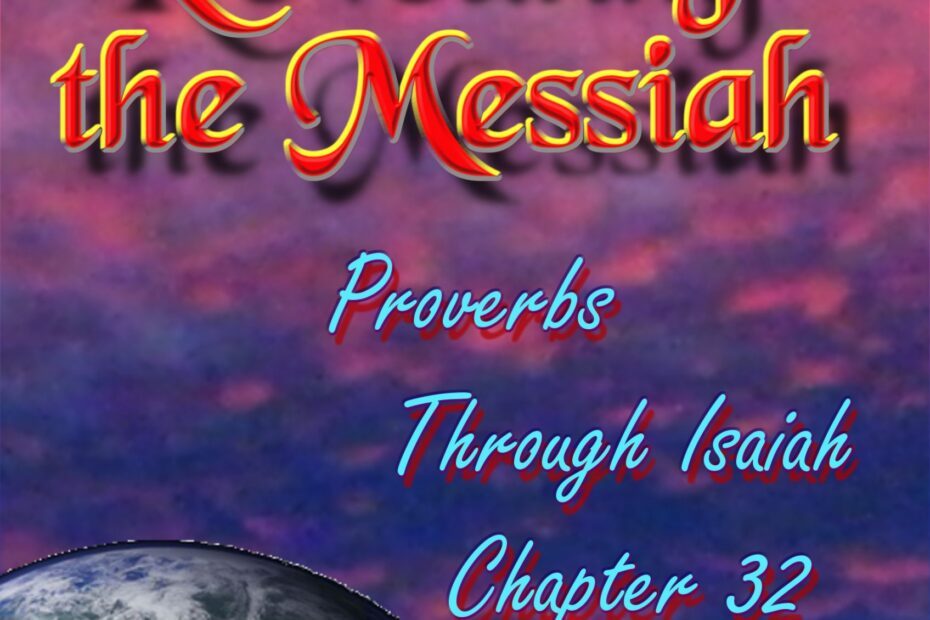Isaiah 9:6-7 A Child is Born
This is a short study on the prophecy Isaiah recorded about Jesus’ birth. The main theme behind this type of study is to hone basic Bible Study skills. Of course the fulfillment of this prophecy was also recorded in the Bible. Now all we have to do is compare the prophecy to the recorded fulfillment. When we compare the two chapters we find one way God communicates with us through the Bible, as well as patterns that are consistent throughout the Bible. In fact, we find how information is multiplied at levels we could not imagine.
Isaiah 9:6-7 NLTse For a child is born to us, a son is given to us. The government will rest on his shoulders. And he will be called: Wonderful Counselor, Mighty God, Everlasting Father, Prince of Peace. (7) His government and its peace will never end. He will rule with fairness and justice from the throne of his ancestor David for all eternity. The passionate commitment of the LORD of Heaven’s Armies will make this happen!
Isaiah is proving to contain a number of prophecies difficult to locate parallel chapters for. What was your first thought on New Testament scripture explaining the fulfillment of a child being born with the government resting on His shoulders? I have to admit my first impression was scripture about Jesus being born. Then I thought the key word government would lead to the answer. I was wrong again. This time it was the third word, peace which led to a matching chapter.
John 20:19-23 NLTse That Sunday evening the disciples were meeting behind locked doors because they were afraid of the Jewish leaders. Suddenly, Jesus was standing there among them! “Peace be with you,” he said. (20) As he spoke, he showed them the wounds in his hands and his side. They were filled with joy when they saw the Lord! (21) Again he said, “Peace be with you. As the Father has sent me, so I am sending you.” (22) Then he breathed on them and said, “Receive the Holy Spirit. (23) If you forgive anyone’s sins, they are forgiven. If you do not forgive them, they are not forgiven.”
After two failed attempts this study reminds us it takes a lot of prayer and patience to wait for the right answer. Isaiah seems to be a difficult book to work with. But how can you hope to understand prophecy if you don’t understand Isaiah? And how can you hope to understand Isaiah if you don’t understand the prophecies about Jesus?
Isaiah provided a brief description of Jesus. He will be called: Wonderful Counselor, Mighty God, Everlasting Father, Prince of Peace. His government and its peace will never end. He will rule with fairness and justice from the throne of his ancestor David for all eternity. Peace is obviously one of the most important promises. It’s a promise no other government can give or keep. The government will rest on his shoulders. Jesus can keep His promise because He cares for those entrusted in His care. It’s no wonder the prophecy points to John’s Gospel. “I am leaving you with a gift–peace of mind and heart. And the peace I give is a gift the world cannot give. So don’t be troubled or afraid. Remember what I told you: I am going away, but I will come back to you again. If you really loved me, you would be happy that I am going to the Father, who is greater than I am. I have told you these things before they happen so that when they do happen, you will believe.” (John 14:27-29 NLTse).
As I prayed about this study I was reminded of the description Isaiah recorded. Then I wondered. How well do we really know Jesus? Is this why some of these studies seem difficult? Is it because we really know little about Jesus, or is it because we have trouble listening to Him? Jesus told us: “I am telling you these things now while I am still with you. But when the Father sends the Advocate as my representative–that is, the Holy Spirit–he will teach you everything and will remind you of everything I have told you.” (John 14:25-26 NLTse). Jesus said the Advocate will teach us everything and remind of everything Jesus told us. Are we too busy dealing with the cares of the world, our own message, or some strange message someone gave you to preach? Are you too wrapped up in future prophecies trying to figure out something Jesus wasn’t or isn’t ready to tell us yet? When you look at the Bible Study rules taught by the prophecies Jesus fulfilled you can’t help but see how inadequate popular interpretations are today. They lack the time and depth of communication with Jesus and His Advocate required to understand simple prophecies already fulfilled.
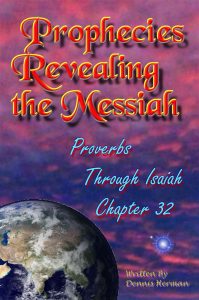
The question lingered on my mind. How well do we really know Jesus? Most Christians know Jesus died on the cross to forgive our sins. But that’s not all. Jesus also died to save His Father’s Kingdom because God and His law was accused of being too restrictive by Satan. We still have Christians today who claim the law is too restrictive. Jesus also died to provide indisputable evidence showing the effects of sin. Satan was allowed to carry out his full plan with few restrictions. Satan showed he was ready, willing, and able to kill God’s Son to secure a higher position. Heaven had to know God’s judgment is just and true. Jesus also died to open up a direct path to God’s throne for all of us and to send His Advocate, God’s Holy Spirit. Jesus’ sacrifice also proved the Levites were unfit to represent God and finish the duties of proclaiming His message. Jesus closed the door on the Levites and opened the door for all of Jesus’ followers to take over the role of priest in homes as well as the community.
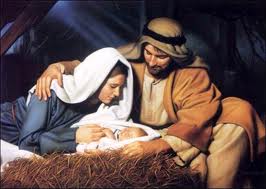 Most people know Jesus is God’s Son and was born to a virgin. Joseph and Mary were His parents on earth. Then Herod tried to kill Jesus so the family fled to Egypt. Jesus was in Egypt to prove God’s Spirit is able to protect everyone from the worst influences the world can throw at them. Jeroboam fled to Egypt to escape Solomon. After Jeroboam returned, he was given ten Israelite tribes to rule. Jeroboam introduced a list of pagan forms of worship to his new kingdom. Satan found a new way in. Jesus’ parents faced the same influence that ruined Jeroboam, but with God’s guidance none of it was transferred to Jesus.
Most people know Jesus is God’s Son and was born to a virgin. Joseph and Mary were His parents on earth. Then Herod tried to kill Jesus so the family fled to Egypt. Jesus was in Egypt to prove God’s Spirit is able to protect everyone from the worst influences the world can throw at them. Jeroboam fled to Egypt to escape Solomon. After Jeroboam returned, he was given ten Israelite tribes to rule. Jeroboam introduced a list of pagan forms of worship to his new kingdom. Satan found a new way in. Jesus’ parents faced the same influence that ruined Jeroboam, but with God’s guidance none of it was transferred to Jesus.
Many people know some details about Jesus’ ministry. He preached for about three and a half years. During that period, Jesus ministered to Jews as well as Samaritans, Romans, Greeks, Syrians, and of course made an extra effort to reach out the religious leaders. Jesus taught with parables and taught His disciples how to understand all scripture. Most people don’t know how to read scripture close enough or how to listen during prayer to see those details.
Some of the things most often taught about Jesus’ ministry include His baptism, the sermon on the mountain, the leper he healed, the religious leader’s daughter and Lazarus He raised from the dead, the paralyzed man lowered through the roof by four friends and the man at the pool Jesus gave the power to walk, the man He put clay on his eyes to restore his sight, the woman who touched the hem of His garment and what Jesus taught the woman at the well.
When we look at the gospels we can’t help but see there were a lot Jesus’ disciples didn’t know much about Him. We see how the disciples were unprepared for His sacrifice on the cross. They lived, ate, slept, walked, and talked with Jesus for over three years and still didn’t know Jesus. People listen to a few half hour sermons about Jesus and think that’s enough. Some people think reading through the Bible or reading a few prepared studies may be enough to learn about Jesus. A movie or two may be the the majority of contact some people have with Jesus. What do we get when we look deeper into scripture to see Jesus’ personality?
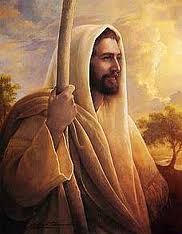 A close examination of scripture will show how Jesus repeated lessons. This shows what a patient teacher Jesus is. Jesus feed a large crowd twice, healed a number of blind, raised a few from death, healed a leper then a group of them, as well as thousands of others we don’t have details about. Jesus also reached out for a real relationship, but his disciples didn’t understand. Neither do a lot of people catch onto Jesus’ quest for a close personal relationship recorded in scripture.
A close examination of scripture will show how Jesus repeated lessons. This shows what a patient teacher Jesus is. Jesus feed a large crowd twice, healed a number of blind, raised a few from death, healed a leper then a group of them, as well as thousands of others we don’t have details about. Jesus also reached out for a real relationship, but his disciples didn’t understand. Neither do a lot of people catch onto Jesus’ quest for a close personal relationship recorded in scripture.
Looking back at the Old Testament we see Jesus the Creator. Long ago God spoke many times and in many ways to our ancestors through the prophets. And now in these final days, he has spoken to us through his Son. God promised everything to the Son as an inheritance, and through the Son he created the universe. The Son radiates God’s own glory and expresses the very character of God, and he sustains everything by the mighty power of his command. When he had cleansed us from our sins, he sat down in the place of honor at the right hand of the majestic God in heaven. (Hebrews 1:1-3 NLTse). Jesus is shown as the deliverer and giver of life when He took the form of a Rock that followed Israel to the promised land. We see Jesus as a warrior when He spoke with Joshua. We see Jesus in many forms. Some we know well. Some we hardly know, and some may be new to us. Do you know about Jesus’ ministry in the Heavenly Sanctuary He is administering in now? Have you talked with Jesus today? Do you treat your relationship with Him as a real relationship or is it based on basic historical data you’ve heard? Maybe your relationship goes no deeper than to have a savior just in case there is a God and the world does end. The deeper we look the more we learn about Jesus. The Old Testament is full of prophecies about Jesus. The New Testament is loaded with details showing how He fulfilled each prophecy as well as stories about His life and ministry. The Book of Hebrews explains what Jesus is doing in Heaven now. How much do you love to study? How much do you study about the One you say you love? Its time we took a deeper look at these two chapters to see what details they reveal.
Isaiah 9:1-5 NLTse Nevertheless, that time of darkness and despair will not go on forever. The land of Zebulun and Naphtali will be humbled, but there will be a time in the future when Galilee of the Gentiles, which lies along the road that runs between the Jordan and the sea, will be filled with glory. (2) The people who walk in darkness will see a great light. For those who live in a land of deep darkness, a light will shine. (3) You will enlarge the nation of Israel, and its people will rejoice. They will rejoice before you as people rejoice at the harvest and like warriors dividing the plunder. (4) For you will break the yoke of their slavery and lift the heavy burden from their shoulders. You will break the oppressor’s rod, just as you did when you destroyed the army of Midian. (5) The boots of the warrior and the uniforms bloodstained by war will all be burned. They will be fuel for the fire.
John 20:1-10 NLTse Early on Sunday morning, while it was still dark, Mary Magdalene came to the tomb and found that the stone had been rolled away from the entrance. (2) She ran and found Simon Peter and the other disciple, the one whom Jesus loved. She said, “They have taken the Lord’s body out of the tomb, and we don’t know where they have put him!” (3) Peter and the other disciple started out for the tomb. (4) They were both running, but the other disciple outran Peter and reached the tomb first. (5) He stooped and looked in and saw the linen wrappings lying there, but he didn’t go in. (6) Then Simon Peter arrived and went inside. He also noticed the linen wrappings lying there, (7) while the cloth that had covered Jesus‘ head was folded up and lying apart from the other wrappings. (8) Then the disciple who had reached the tomb first also went in, and he saw and believed— (9) for until then they still hadn’t understood the Scriptures that said Jesus must rise from the dead. (10) Then they went home.
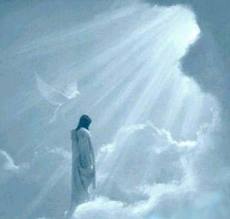 The new light for this world is Jesus rising from the tomb symbolizing His victory over death. After Jesus rose from the grave the disciples began to understand who Jesus is and what He has to offer. They began to understand more about this world than they ever expected to see. Their ministry was to tell the world about the prophecies Jesus fulfilled. That was the evidence the disciples were given. Satan, who is the god of this world, has blinded the minds of those who don’t believe. They are unable to see the glorious light of the Good News. They don’t understand this message about the glory of Christ, who is the exact likeness of God. You see, we don’t go around preaching about ourselves. We preach that Jesus Christ is Lord, and we ourselves are your servants for Jesus’ sake. For God, who said, “Let there be light in the darkness,” has made this light shine in our hearts so we could know the glory of God that is seen in the face of Jesus Christ. We now have this light shining in our hearts, but we ourselves are like fragile clay jars containing this great treasure. This makes it clear that our great power is from God, not from ourselves. (2 Corinthians 4:4-7 NLTse). Don’t you realize that you become the slave of whatever you choose to obey? You can be a slave to sin, which leads to death, or you can choose to obey God, which leads to righteous living. (Romans 6:16 NLTse).
The new light for this world is Jesus rising from the tomb symbolizing His victory over death. After Jesus rose from the grave the disciples began to understand who Jesus is and what He has to offer. They began to understand more about this world than they ever expected to see. Their ministry was to tell the world about the prophecies Jesus fulfilled. That was the evidence the disciples were given. Satan, who is the god of this world, has blinded the minds of those who don’t believe. They are unable to see the glorious light of the Good News. They don’t understand this message about the glory of Christ, who is the exact likeness of God. You see, we don’t go around preaching about ourselves. We preach that Jesus Christ is Lord, and we ourselves are your servants for Jesus’ sake. For God, who said, “Let there be light in the darkness,” has made this light shine in our hearts so we could know the glory of God that is seen in the face of Jesus Christ. We now have this light shining in our hearts, but we ourselves are like fragile clay jars containing this great treasure. This makes it clear that our great power is from God, not from ourselves. (2 Corinthians 4:4-7 NLTse). Don’t you realize that you become the slave of whatever you choose to obey? You can be a slave to sin, which leads to death, or you can choose to obey God, which leads to righteous living. (Romans 6:16 NLTse).
One of the details we see repeated is the disciples saw the linen wrappings lying there. Because it’s repeated it becomes one of the main considerations in the story. This points to the fact Jesus came out of the tomb naked which leads us to other texts. “I tell you the truth, unless you are born again, you cannot see the Kingdom of God.” “What do you mean?” exclaimed Nicodemus. “How can an old man go back into his mother’s womb and be born again?” Jesus replied, “I assure you, no one can enter the Kingdom of God without being born of water and the Spirit. (John 3:3-5 NLTse). Jesus’ resurrection was a symbol of a new birth.
Not only did the disciples begin to understand when they saw the empty tomb, it marked the moment the world would begin to understand. Jesus came from the tomb to shed new light on the world and break the yoke of bondage of not only sin but death and the grave. The introductions tie in these two chapters better than any parallel chapters with a prophecy and its fulfillment. Now it’s time to study the summations.
Isaiah 9:14-21 NLTse Therefore, in a single day the LORD will destroy both the head and the tail, the noble palm branch and the lowly reed. (15) The leaders of Israel are the head, and the lying prophets are the tail. (16) For the leaders of the people have misled them. They have led them down the path of destruction. (17) That is why the Lord takes no pleasure in the young men and shows no mercy even to the widows and orphans. For they are all wicked hypocrites, and they all speak foolishness. But even then the LORD’s anger will not be satisfied. His fist is still poised to strike. (18) This wickedness is like a brushfire. It burns not only briers and thorns but also sets the forests ablaze. Its burning sends up clouds of smoke. (19) The land will be blackened by the fury of the LORD of Heaven’s Armies. The people will be fuel for the fire, and no one will spare even his own brother. (20) They will attack their neighbor on the right but will still be hungry. They will devour their neighbor on the left but will not be satisfied. In the end they will even eat their own children. (21) Manasseh will feed on Ephraim, Ephraim will feed on Manasseh, and both will devour Judah. But even then the LORD’s anger will not be satisfied. His fist is still poised to strike.
John 20:24-31 NLTse One of the disciples, Thomas (nicknamed the Twin), was not with the others when Jesus came. (25) They told him, “We have seen the Lord!” But he replied, “I won’t believe it unless I see the nail wounds in his hands, put my fingers into them, and place my hand into the wound in his side.” (26) Eight days later the disciples were together again, and this time Thomas was with them. The doors were locked; but suddenly, as before, Jesus was standing among them. “Peace be with you,” he said. (27) Then he said to Thomas, “Put your finger here, and look at my hands. Put your hand into the wound in my side. Don’t be faithless any longer. Believe!” (28) “My Lord and my God!” Thomas exclaimed. (29) Then Jesus told him, “You believe because you have seen me. Blessed are those who believe without seeing me.” (30) The disciples saw Jesus do many other miraculous signs in addition to the ones recorded in this book. (31) But these are written so that you may continue to believe that Jesus is the Messiah, the Son of God, and that by believing in him you will have life by the power of his name.
We see the key words in the summation for Isaiah 9 are devour, eat, and feed. This seems to have little in common with the key word peace written in the main prophecy as well as the introduction’s key words light and shine. The introduction also has key words break and destroyed as well as burden and slavery which shows a connection between the introduction and summation in Isaiah 9.
Isaiah’s introduction tells about a time of darkness and despair will not go on forever. One day the people who walk in darkness will see a great light. Using basic Bible Study rules we’ve been shown Jesus is that light. Hardly anyone understood that light until after Jesus rose from the tomb. John’s summation shows some details on that light as well as explaining the spiritual meaning the other key words devour, destroy, burden, and slavery lead to.
In John’s summation in chapter 20, the key words disciple, believe, and wounds tell a story all their own. As often as the word believe is repeated, one of the main themes in the summation to John 20 deals with a disciple who refused to believe unless it was done their way. It seems people like Thomas had to make their own set of rules.
We also see another term shared by the introduction and summation in John 20. Why would John open this chapter in his book with the term closed doors and repeat it near the end? One important aspect of good solid Bible Study is to put yourself in place of the characters as well as the author by praying and carefully listening. In this case you have to ask what lesson was John trying to convey? More often than not, the author will quote scripture at a point like this. When you look at the scripture quoted it will provide the explanation. Does John quote scripture here? Not directly. John closed this chapter by writing: The disciples saw Jesus do many other miraculous signs in addition to the ones recorded in this book. But these are written so that you may continue to believe that Jesus is the Messiah, the Son of God, and that by believing in him you will have life by the power of his name.
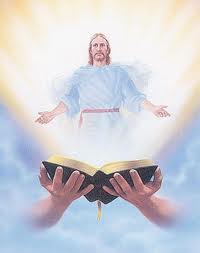 We have to remember and apply another Bible Study rule here. The end of a chapter is arranged to lead into the next chapter. In other words there is a distinct relationship between the end of one chapter and the beginning of the next. This is a transition from one thought to another. Also remember the introduction and summation of each chapter relate to the same theme which is the context of the chapter. In this case we see a close relationship between the end of chapter 20 and the end of John’s Gospel. The disciples saw Jesus do many other miraculous signs in addition to the ones recorded in this book. But these are written so that you may continue to believe that Jesus is the Messiah, the Son of God, and that by believing in him you will have life by the power of his name. (John 20:30-31 NLTse). This disciple is the one who testifies to these events and has recorded them here. And we know that his account of these things is accurate. Jesus also did many other things. If they were all written down, I suppose the whole world could not contain the books that would be written. (John 21:24-25 NLTse).
We have to remember and apply another Bible Study rule here. The end of a chapter is arranged to lead into the next chapter. In other words there is a distinct relationship between the end of one chapter and the beginning of the next. This is a transition from one thought to another. Also remember the introduction and summation of each chapter relate to the same theme which is the context of the chapter. In this case we see a close relationship between the end of chapter 20 and the end of John’s Gospel. The disciples saw Jesus do many other miraculous signs in addition to the ones recorded in this book. But these are written so that you may continue to believe that Jesus is the Messiah, the Son of God, and that by believing in him you will have life by the power of his name. (John 20:30-31 NLTse). This disciple is the one who testifies to these events and has recorded them here. And we know that his account of these things is accurate. Jesus also did many other things. If they were all written down, I suppose the whole world could not contain the books that would be written. (John 21:24-25 NLTse).
John did refer to scripture. Once John saw the light which was revealed when Jesus explained all the prophecies that He fulfilled to all the disciples, he couldn’t help but share the good news at the beginning and end of his book. John did what Jesus set out to do, point people back to scripture.
We also see another set of related texts in the summations for Isaiah 9 and John 20. Thomas didn’t believe Jesus was alive. Some people say Thomas doubted. That’s a nice way of saying Thomas challenged Jesus, God, and His Spirit. Thomas also stood apart from the other disciples. Keep in mind the locked door and how it applies to both the disciples and Christianity today. Notice how the word wounds is repeated. Look at where the wounds recorded by John are located. Did you notice wounds that are missing? What happened to Jesus’ wounded feet? Were they healed? Does Jesus now have scares or are His wounds still open? What about the wounds on His back? Is Jesus’ back still ripped open or are they now scares He has to bear for all eternity?
John left off Jesus’ feet because of his personal contact with Jesus. Who is worthy to wash Jesus’ feet and see the wounds where the nail was driven to hold Him to that cross? John loved Jesus so much he wanted to save that privilege for himself. Thomas didn’t really know Jesus, otherwise he would have never doubted. Jesus had to tone down His own wounds to meet Thomas where he was. Jesus didn’t want to loose Thomas. Jesus doesn’t want to loose anyone. But Jesus wants people to find Him by looking deeper into all the stories about Him.
By combining the summation for Isaiah 9 and John 20, we see another spiritual lesson, one that has an important bearing on Christianity today. Thomas’ unbelief has a deeper more personal meaning people want to avoid like looking at the feet that were wounded for us. Have you ever thought about Thomas’ unbelief on a personal level? Why didn’t Thomas want to believe? Jesus’ resurrection should have been the happiest moment in his life. A moment Thomas should have been happy and willing to share. Instead Thomas held a sense of mistrust towards the other disciples. No one could deny the joy and excitement exhibited by the other disciples, but Thomas decided to hang onto feelings that just didn’t fit the situation at all. Why? We see Isaiah provided the answer hundreds of years before the event. Therefore, in a single day the LORD will destroy both the head and the tail, the noble palm branch and the lowly reed. The leaders of Israel are the head, and the lying prophets are the tail. For the leaders of the people have misled them. They have led them down the path of destruction.
In a single day Jesus revealed the truth about all the prophecies the religious leaders misinterpreted. They held their traditions and reputations to a higher degree than the Son of God. Even after Jesus’ resurrection the religious leaders continued to plot and maneuver to save their coveted reputations, traditions, and doctrines which meant more to them than truth. Isaiah’s summation only tells a small part of the prophecy. The lies, mistrust and disbelief did not end with Thomas who was only a symbol. They will attack their neighbor on the right but will still be hungry. They will devour their neighbor on the left but will not be satisfied. In the end they will even eat their own children. Manasseh will feed on Ephraim, Ephraim will feed on Manasseh, and both will devour Judah. But even then the LORD’s anger will not be satisfied. His fist is still poised to strike.
When we follow basic Bible Study rules we focus on the key words the author repeated, so we concentrate on the words devour, eat, and feed. Those are actions words describing what will happen. Asking who it will happen to is another question. In this case Isaiah provided another list of symbols. There is also a spiritual relationship between the words neighbor, children, Ephraim and Manasseh who were brothers. We can see how personal Isaiah is getting by using the symbols of neighbor, children, and brothers. Who do we see fitting those descriptions when we apply them to Thomas?
Isaiah’s summation also tells us how fast disbelief will spread. This wickedness is like a brushfire. It burns not only briers and thorns but also sets the forests ablaze. Its burning sends up clouds of smoke. Disbelief not only spreads but smoke blocks out light. Evilness also works with a double edged sword. How many people can really see the wounds Jesus carries? How many people talk about the wounds John intentionally didn’t mention? How many people look beyond the printed word into the emotions of the characters and authors? If they did, many Christians would not act the way they do or preach some of the messages they think are true.
I get upset every time I hear messages pointed at separating denominations. Thomas didn’t have the same beliefs the other disciples shared, but Jesus still reached out to him. I see a world where Christians spend long hours looking for faults in other denominations and writing long drawn out sermons about their differences because it makes them popular. Is this really what Jesus placed Himself under a Roman whip for? Too much of the world preaches separation. Is that what Jesus walked to the cross for? Too many Christians focus on minor details and differences to try and prove themselves better then brothers and sisters in Christ. Is this what Jesus hung on the cross for? They will devour their neighbor on the left but will not be satisfied. In the end they will even eat their own children. If people really knew Jesus, how would they act? How would they reach out to other Christians? How could they learn to work together to finish the work we’ve been given?
 How well do you know Jesus and the wounds He carries? If the world knew, there would be no more killing, no more taking advantage of the poor and needy. If the churches who claimed to follow Jesus knew Him and the scars on His body, they would not be fighting among one another claiming to be the best, the remnant, the only church with the truth. If they really knew Jesus, they would know the truth. They would have answers on how to reach out to others, to everyone, no matter what their denomination or religion. Jesus did.
How well do you know Jesus and the wounds He carries? If the world knew, there would be no more killing, no more taking advantage of the poor and needy. If the churches who claimed to follow Jesus knew Him and the scars on His body, they would not be fighting among one another claiming to be the best, the remnant, the only church with the truth. If they really knew Jesus, they would know the truth. They would have answers on how to reach out to others, to everyone, no matter what their denomination or religion. Jesus did.
If people knew Jesus and what held Him on that cross, they would not bicker about little matters inside the church. They would not lie and gossip about members in the church or discourage them from seeking personal ministries.
People write songs about Jesus’ arms, His hands, and the crown of thorns upon His head. But no one seems to write or sing about His feet. The feet covered with dust from the road to Golgotha. The prophecy here says the government will rest on his shoulders. What held up those shoulders on the cross? The nails in His feet. On the cross His feet were the closet part of Jesus to this world. His disciples looked straight at His feet nailed to that cross and wondered why. Those were the feet that were covered by the apron around His waist as He bend down to wash His disciples feet. Now Jesus’ feet were covered in blood and dirt. Who sings about washing the feet of their King?
